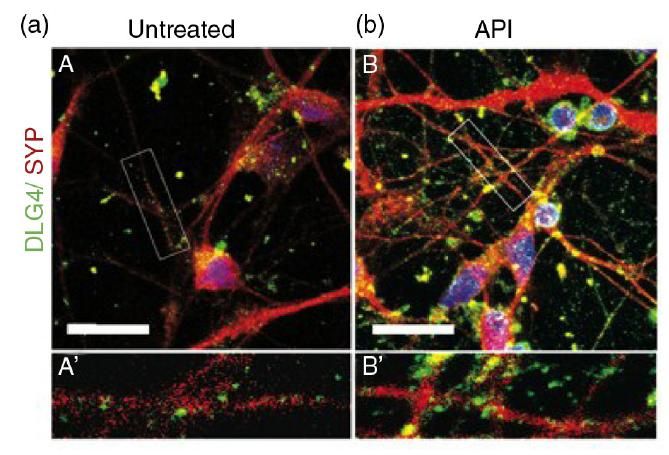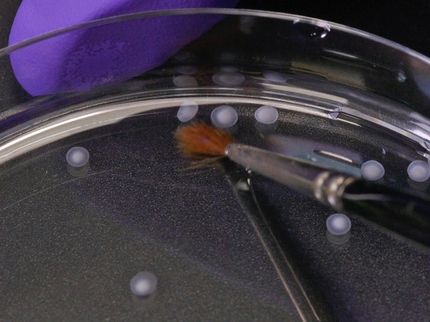Plant compound found in spices and herbs increases brain connections
Brazilian researchers from D'Or Institute for Research and Education (IDOR), Federal University of Rio de Janeiro (UFRJ) and Federal University of Bahia (UFBA) have demonstrated in laboratory that apigenin, a substance found in parsley, thyme, chamomile and red pepper, improves neuron formation and strengthens the connections between brain cells.

The neurons treated with apigenin (right) show more formation of synapses (red) than the neurons that were not treated.
Rehen et al.
Previous experiments with animals had already shown that substances from the same chemical group as the apigenin, known as flavonoids, positively affect memory and learning. Many studies highlight the potential of flavonoids to preserve and enhance brain function. While the effectiveness of flavonoids for brain health is not an entirely new concept, this research is the first to show the positive effects of apigegin directly on human cells and the first to unraveling its mechanism.
The scientists observed that just by applying apigenin to human stem cells in a dish they become neurons after 25 days - an effect they would not see without the substance. Moreover, the neurons that were formed made stronger and sophisticated connections among themselves after being treated with this natural compound.
"Strong connections between neurons are crucial for good brain function, memory consolidation and learning", says neuroscientist from IDOR and UFRJ Stevens Rehen.
The research team conducted by Rehen demonstrated that apigenin works by binding to estrogen receptors, which affect the development, maturation, function, and plasticity of the nervous system. This group of hormones is known to delay the onset of psychiatric and neurodegenerative disorders such as schizophrenia, depression, Alzheimer's and Parkinson's disease. However, the use of estrogen-based therapies is limited by the increased risk of estrogen-dependent tumors and cardiovascular problems.
Researchers believe apigenin can be used as an alternative approach on future treatments for neurodegenerative diseases as well as in neuronal differentiation strategies in laboratory.
"We show a new path for new studies with this substance", points out Rehen. "Moreover, flavonoids are present at high amounts in some foods and we can speculate that a diet rich in flavonoids may influence the formation of neurons and the way they communicate within the brain."
Original publication
Original publication
Cleide S. Souza, Bruna S. Paulsen, Sylvie Devalle, Silvia Lima Costa, Helena L. Borges and Stevens K. Rehen; "Commitment of human pluripotent stem cells to a neural lineage is induced by the pro-estrogenic flavonoid apigenin"; Advances in Regenerative Biology; 2015
Organizations
Other news from the department science

Get the life science industry in your inbox
By submitting this form you agree that LUMITOS AG will send you the newsletter(s) selected above by email. Your data will not be passed on to third parties. Your data will be stored and processed in accordance with our data protection regulations. LUMITOS may contact you by email for the purpose of advertising or market and opinion surveys. You can revoke your consent at any time without giving reasons to LUMITOS AG, Ernst-Augustin-Str. 2, 12489 Berlin, Germany or by e-mail at revoke@lumitos.com with effect for the future. In addition, each email contains a link to unsubscribe from the corresponding newsletter.
Most read news
More news from our other portals
Last viewed contents
Dyax Corp. Appoints Ron Cohen, M.D. and Paolo Pucci to Board of Directors
CureVac Presents Results of a Phase I/IIa Trial in Non-Small Cell Lung Cancer (NSCLC) with CV9201

DYNA Instruments GmbH - Hamburg, Germany




















































